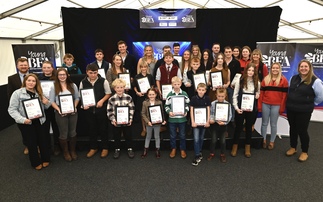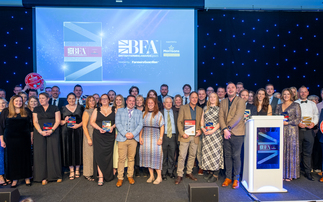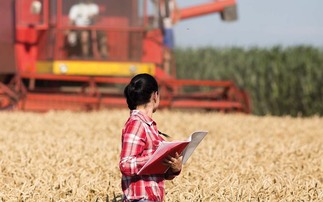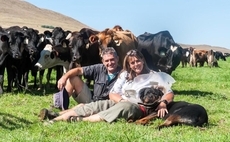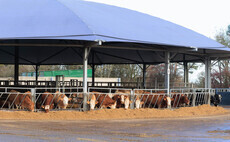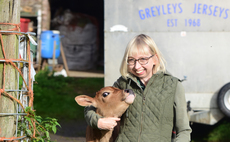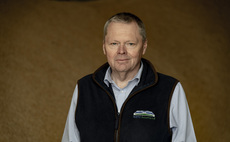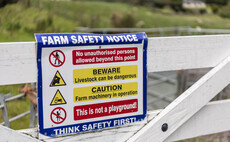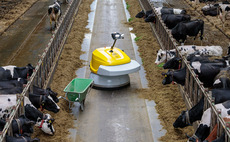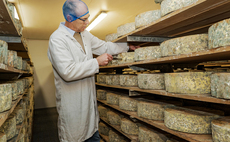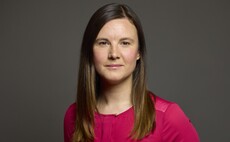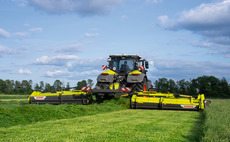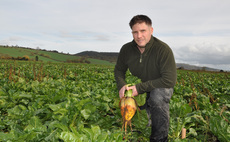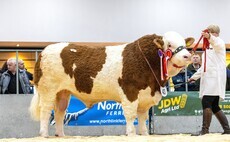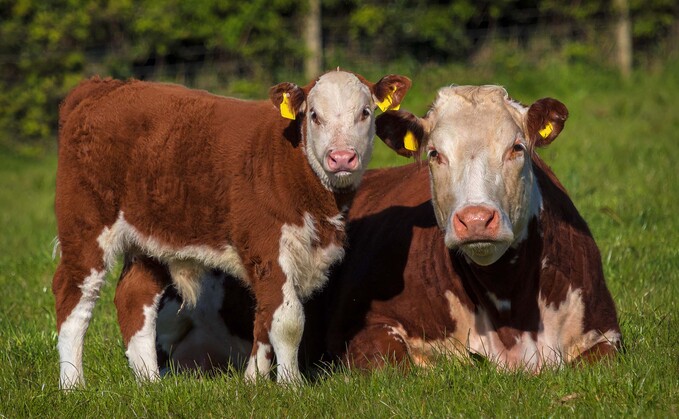
For thirteen years, the British Farming Awards have shone a light on the best in British Farming. During this annual event, Britain's farming industry comes together to celebrate the achievements of its contemporaries.
These finalists are making the most of opportunities presented to them, whether that be in the management of quality cattle, demonstrating good stockmanship or implementing best practice. Each of these farmers have introduced different ways to positively contribute to climate-friendly farming, improving efficiency, productivity and profitability.
READ NOW: Warwickshire family champions Simmental cattle after 50 years of pedigree breeding
Finalists
Matthew Wright - Staffordshire
Staffordshire beef farmer Matthew Wright has grown his enterprise into a cornerstone of a diverse 610-hectare family business. Managing 100 pedigree Aberdeen Angus suckler cows and 500 finishing cattle alongside 200 pedigree Jersey dairy cattle and a 600-ewe flock, Matthew has positioned the beef enterprise to now account for half of the farm's annual turnover.
The suckler herd is split between spring and autumn calving, with cows making the most of lower-input grazing on land within Countryside Stewardship. Almost entirely pedigree, the herd is run on a commercial footing, with heifers retained for breeding and bull calves finished intensively under 16 months. A small number of bulls are sold for breeding each year, balancing genetic progress with resilience to local TB risks.
The finishing system, underpinned by two Approved Finishing Units, provides flexibility to manage cattle from birth through to slaughter, including Blade contract animals and stock purchased from markets. This allows Matthew to mitigate disease risk while responding to evolving supply chains.
Innovation has been central to growth. From introducing Aberdeen Angus genetics eight years ago to adopting electronic ID for health and weight monitoring, a TMR feeding system, and continuous housing improvements, each step has been designed to boost efficiency, health, and performance. "Efficiency drives everything we do," says Matthew, who manages the beef enterprise with support from his wife, who handles compliance and paperwork, while his parents lead the dairy side.
Future challenges such as labour shortages and price volatility are being met head-on through investment in automation, contracts for cattle and feed, and a pending calf housing grant application that would strengthen efficiency and welfare. Through the ABP PRISM scheme, Matthew is also auditing and reducing the farm's carbon footprint. Lower calving and slaughter ages are already making a tangible impact, aligning profitability with sustainability.
READ NOW: How a tight calving period can improve profitability
Emily Upton - Shropshire
At Harper Adams University's 1,000-hectare Future Farm in Shropshire, Emily Upton oversees a beef enterprise that must balance commercial performance with teaching and research. The unit manages 125 indoor finishing cattle and a growing outdoor herd of 50 Aberdeen Angus and Beef Shorthorns, all homebred from the award-winning dairy herd.
The intensive system houses up to 84 finishers at any one time, mainly British Blue and Angus crosses, fed on homegrown maize, grass, and barley. Three rations are tailored to growth stages, with weekly feed refusal checks and fortnightly weighing ensuring precision, minimal waste, and consistent daily liveweight gains. The farm's cattle are currently finished at around 13.5 months, achieving impressive weights and carcass yields.
Alongside the intensive unit, the newer outdoor herd reflects Emily's drive to expand extensive, lower-input beef systems. "We want to build a dataset over time," she explains, "to measure health, welfare, and soil benefits while maintaining efficiency." Innovation underpins the enterprise. Growsafe feeders monitor individual intakes, genetics are carefully selected for feed efficiency and growth, and stocking densities have been reduced to improve performance, cutting finishing age by two months. These changes have not only boosted productivity but also strengthened the farm's sustainability credentials.
Challenges ahead include rising production costs and shifting consumer attitudes towards red meat. To mitigate these, Emily has diversified sales through meat boxes, local butchers, and pubs, building stronger connections with consumers. At the same time, the unit is working to grow its own protein crops to further reduce reliance on volatile feed markets.
With Harper Adams committed to net zero by 2030, Emily's focus is on efficiency and homegrown feed. The farm has already halved the carbon footprint of dairy-beef production, achieving just 12kg CO₂ per kilo of beef. Through rotational grazing, genetics, and data-led decision making, she is demonstrating how the next generation of beef systems can be both profitable and sustainable.
Graham Parks - Cheshire
Tenant farmer Graham Parks runs a highly efficient regenerative beef system across 125 hectares in Cheshire, managing between 580 and 865 dairy-bred cattle at different stages. His enterprise has grown dramatically over the past decade, from a 50-acre council smallholding to a larger tenancy where he now rears all calves sourced from a single spring block-calving dairy herd.
Each year, Graham buys 300 Aberdeen Angus and Hereford calves within a six-week window, raising them in carefully managed groups to maximise health and uniformity. Early-life nutrition and robust vaccination protocols underpin survival and growth, with zero calf mortality recorded in the past two years. Strict rotational grazing, supported by weekly grass measurements on Agrinet, ensures forage utilisation is optimised, while herbal ley reseeds have boosted drought resilience and soil health. With 95% of the herd's diet forage-based, reliance on bought-in concentrates has fallen significantly.
The results speak for themselves: finishing ages have reduced by five months over the past five years, now averaging 27 months. Cow output per hectare exceeds £2,880, gross margin per cow sits at nearly £780, and return on tenant's capital has risen to 12.9%. The farm's profitability has tripled in five years, while its carbon footprint has fallen almost 9% year-on-year.
Graham is one of just six UK farmers supplying regenerative beef to Grassroots Farmers, an initiative requiring independently audited standards on soil, biodiversity, and inputs. Alongside rotational grazing and herbal leys, he has introduced stream fencing, hedge planting, water harvesting, and strict carbon auditing to evidence his progress towards net zero.
Looking ahead, Graham faces the challenge of tenancy uncertainty, but is already investing in infrastructure and exploring land purchase to secure his business. With strong markets for beef and growing demand for regenerative produce, his focus is on building a sustainable, profitable system for the future.
Katie Davies - Glamorgan
Farming 600 hectares across owned and tenanted land in the South Wales Valleys, Katie Davies runs a herd of 45 Stabiliser suckler cows alongside 1,000 Welsh Mountain ewes. The beef enterprise is based on a low-input, grass-based system, with cows out on the hill for nine months of the year and calves sold straight off the cow at six to seven months.
Katie and her husband, Trystan, have transformed the herd since 2019, when poor performance in their pedigree Welsh Blacks prompted a switch in breeding strategy. By introducing Stabilisers, they have harnessed hybrid vigour and genomics to select efficient, fertile, small-framed cows capable of thriving at 2,000ft on marginal grazing. The results are striking: calving at two years old, scanning rates of 102%, virtually no assisted calvings, and mortality at zero. Weaning weights average 250–300kg, with most cows weaning more than 50% of their bodyweight.
In 2025, Katie secured funding for No Fence virtual collars, a pioneering technology that uses GPS to monitor herd movements, create targeted grazing blocks, and improve the management of Sites of Special Scientific Interest (SSIs). This innovation promises to boost grazing utilisation, enhance biodiversity, and support soil fertility while improving animal welfare.
Katie's vision is rooted in sustainability. Independent research shows Stabiliser-based systems emit 40% less carbon than the UK average, helping her business stay ahead of net zero targets. Beyond the farm gate, she is exploring collaboration with South Wales Fire Service to use cattle in wildfire prevention by creating natural firebreaks, and with her local authority on peatland restoration. Blending science-led breeding with cutting-edge grazing technology, Katie Davies is proving that suckler cows can be both profitable and pivotal in managing upland environments for the future.
READ NOW: On-farm Somerset restaurant serves home-produced Hereford beef
Taking place on 16 October at The VOX in Birmingham, the event will welcome industry professionals from across the country to celebrate British agriculture and the successes it has had this year.
Get your tickets here to celebrate with the finalists at The British Farming Awards: https://www.britishfarmingawards.co.uk/britishfarmingawards/en/page/table-packages









